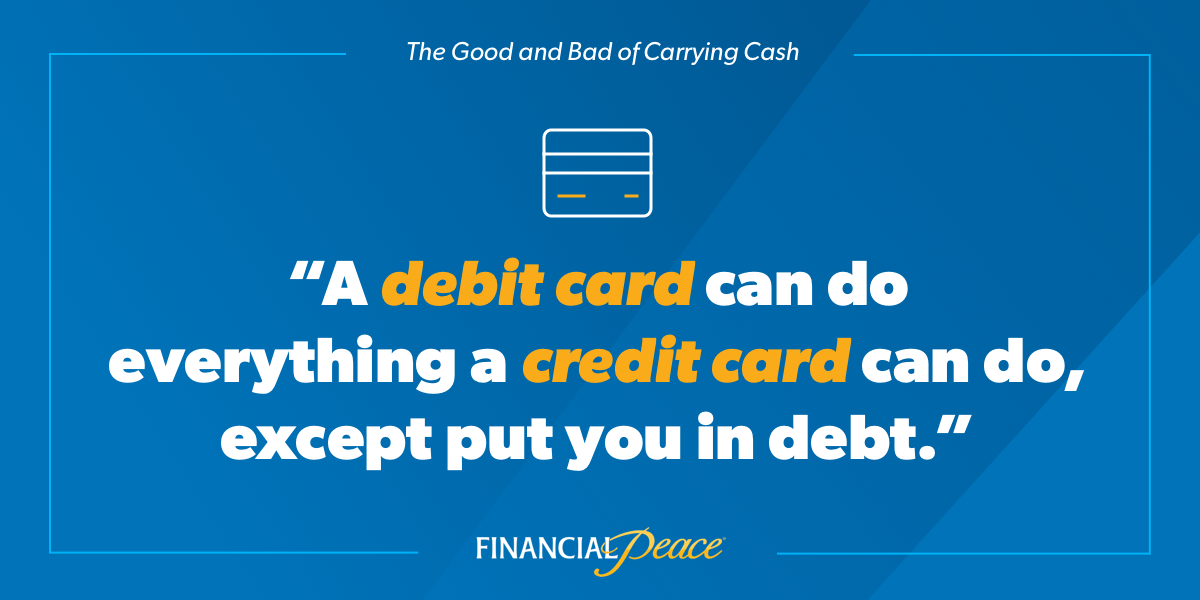Cash vs. Credit Card: Which Should I Use?

You’re about to charge another $1 for an iced tea to your credit card. That’s the third time this week. You think it’s easier to carry a couple of cards in your wallet than a handful of cash and coins. Sure, cards are less bulky, but paying with cash means you won’t have to worry about your iced-tea tab a month from now.
If you’re on the fence about the benefits of carrying cash, check out why paying with green is always better than swiping your plastic.
Is paying with cash really easier than using a credit card?
We think so. But the topic of using cash versus credit card is a hot one. People use a lot of popular excuses for keeping a card around, but we don’t buy any of them.
Cash vs. Credit Card: What Are the Excuses for Credit Card Use?
Excuse 1: I’ll blow through all my money because I lack self-control.
Our response: Children do what feels good, but adults devise a plan and follow it. So be an adult—make a plan for your money and stick with it. Undisciplined spending often is a symptom of a larger problem. Control your spending, and you’ll be able to control other areas of your life as well.
Excuse 2: I can’t recover cash if someone steals my purse or wallet.
Our response: Paulette the Pickpocket doesn’t have psychic abilities (despite her super-villain name), so she doesn’t know you’re walking around with $300 cash in your wallet. And even if she did, it’s not the cash you’ll want back. It’s the hours you’ll spend on the phone canceling cards, changing account numbers, and cleaning up your credit card mess. Believe us, you’d rather someone steal your cash than your identity.
Excuse 3: I can’t use cash to book travel online. Credit cards are just easier for booking trips.
Our response: Two words for you: debit card. Online travel is one of the biggest excuses in the cash versus credit card discussion. But at the end of the day, paying with a debit card online is just as secure as using a credit card. And it’s the only (almost) same-as-cash payment we approve of. Go ahead and use your debit card to reserve a hotel room or purchase a plane ticket, but pay cash for your meals when you travel.
Excuse 4: Cash is so bulky and messy, plus all that loose change just gets lost.
Our response: Organizing your cash and coins is as easy as using the envelope system and a simple jar that fits into your car’s cup holder. The cash will stay perfectly organized, and the coins will collect nicely until you’re ready to turn them into dollars! If you can organize your playlist, you have what it takes to organize your dough.
Excuse 5: Cash takes too long to dig out in line at the store.
Our response: We’re not saying you should be “that guy” who pays for all his groceries in pennies. We’re just saying it’s okay to give yourself a moment to count correct change. Patience is a virtue, so help the three nice folks in line behind you practice it.
Now that we’ve covered the most common excuses for credit card use, let’s look at the benefits of cash. Trust us: We know that nothing compares to using cash for every single purchase.

Cash vs. Credit Card: What Are the Benefits of Using Cash?
What you have is what you can spend.
Unlike credit, your cash envelopes (thankfully) can’t deliver an endless stream of purchasing power. If you blow your grocery budget at the beginning of the month, you’ll feel it at the end of the month. Habits change in a hurry the first time you empty your food envelope a week before your next paycheck. Seven days of tuna fish sandwiches may be the best overdraft protection there is.
You spend less when you use cash.
Swiping plastic doesn’t hurt like spending your hard-earned cash. Once you’ve had some quality time with Benjamin Franklin, you’ll think twice before sending him to a cold, hard, cash-register coffin. To stretch his life a bit, you’ll shop around, look for deals, and naturally spend less.
Cash can get you a deal.
When it comes to using cash versus credit card, there’s no better bargaining chip than a pocket full of cash. There’s just something about the smell that drives salesmen wild. Try spreading the scent of cash around the next time you’re hunting for a car. Fun (and a deal!) will follow.
Paying with cash reduces your chances of having your identity stolen.
According to the 2017 Identity Fraud Study released by Javelin Strategy & Research, $16 billion was stolen from 15.4 million Americans in 2016.(1) Each swipe of your card or input of your card numbers online increases your chance of having your personal information compromised. Raise your hand if you want to have your identity stolen? Um, no one. So, use cash and keep your personal information to yourself.
Cash is convenient.
Think of the times you run into the dollar store and buy a few items . . . it’s easier to pull out a few bucks, pay, and be done with it. From your daughter’s piano lessons to the Girl Scout cookies outside of Walmart, there are times in life when cash is still the easiest way to pay.
Purchases become a blessing, not a curse.
When you avoid debt, something incredible happens: Your brand-new transmission, re-upholstered reading chair, and even your kids’ Cap’n Crunch won’t accrue interest—ever. What a beautiful thing!
In order to fully enjoy the benefits of using cash, all you have to do is swing by the bank and actually get some out. It’s pretty much downhill from there—budget well, spend less, and bargain more.
Then, see if that occasional iced tea doesn’t taste any sweeter.
Comments
Post a Comment